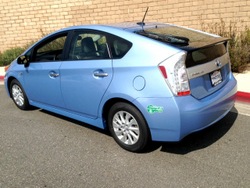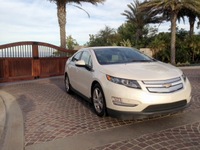Electric Cars, Plug-Ins Electrics, Diesel Sales Look Good Two-Thirds of the Way Though the Year
August sales reports are in and the Nissan Leaf set a sales record, leading the way among electric cars for the year-to-date. Plug-in hybrids and clean diesels also are outpacing the market overall. Of the alternatives to gasoline-only vehicles, only traditional hybrids are lagging for the year, though they, too, had a great August. The Top 10 High-MPG cars remain a benchmark for how far and how fast automotive technology is advancing.
Because sales numbers tend to jump month-to-month based on incentives, the weather and all manner of influences, we like to take the long view, so we’ll focus on the January-August figures. Taking that longer view it’s clear that the trend to high-mileage is continuing even as those gasoline-only vehicle also continue to get more efficient.

The leaders present a good cross-section of the high-mileage alternatives out there, ranging from the always popular Toyota Prius Liftback (and its single-letter cousins–the c and V) to VW’s diesel siblings the Jetta TDI and Passat TDI to the all-electric Nissan Leaf and plug-in hybrid Chevy Volt. The ease of getting better than 40 mpg is clearer than ever.
One curious feature this month is the generally poor showing of the Top 10 high-MPG cars compared with last year. All but the Nissan Leaf and Hyundai Sonata Hybrid are off of last year’s sales marks, although we should note the Ford Fusion Hybrid is nearly even. This may simply reflect the one category of alternative vehicles that is down from last year, hybrids. Even with a good August, hybrid sales are down 8.7 percent from last year and that segments market share has dropped below 3 percent. It may be that the proliferation of 40 mpg gasoline cars has blunted the impact of hybrids.
Plug-in hybrids, pure electrics and diesels are bucking that trend with sales outpacing an overall market that is 5 percent ahead of last year. Those three segments represent a smaller volume than the hybrid market, though, adding up to 1.62 percent of the total market.
Here are the Top 10 High-MPG vehicles with their year-to-date sales figures (January-August 2014) and their fuel economy ratings. We’re using data from Hybridcars.com and Baum & Associates. Links with each of the Top 10 go to our road tests and new articles about the models.
YTD Sales Change from previous year MPG 90,627 -16.5% 51 MPG City
30,700 -6.3% 43 MPG City
28,372 -5% 53 MPG City
27,053 -13.2% 42 MPG Hwy
- Ford Fusion Hybrid
26,594 -1.1% 44 MPG City
- Volkswagen Passat TDI
22,389 -10.9% 43 MPG Hwy
20,725 -20.2% 44 MPG City
18,941 +34.1% 126 MPGe City
- Hyundai Sonata Hybrid
16,059 +11.9% 40 MPG Hwy
- Ford C-Max Hybrid
14,136 -37.3 42 MPG City
Bubbling just below the Top 10 are some other significant vehicles–the top-selling plug-in hybrid, the Chevy Volt (13,146 sold), Lexus CT200h (12,507), Toyota Avalon Hybrid (11,915), Toyota Prius Plug-in Hybrid (11,489) and Tesla Model S (10,600). Other encouraging signs are that the new BMW i3 electric car appears to be showing strong sales and the Chevy Cruze Diesel popped up to number three in the diesel market this last month.

Related stories you might enjoy:
Welcome to the new MPG Clubs
Best electric cars and plug-in hybrids for 2014
Top 10 electric car makers

You should really use MPGe for diesel cars. Diesel is 10-15% more dense than gasoline, which means it has more energy per gallon, and it produces more carbon pollution per gallon than gasoline.
Both the Jetta TDI and Passat TDI fall out of your 40 MPG club if you use MPGe for diesel. I think that’s only fair, since you use MPGe for plugin cars.
@Bryan.Catanzaro,
A good suggestion, Bryan, but MPGe is still a work in progress in my opinion. Maybe we could try a well-to-wheel CO2 g/mi (grams per mile) measurement, though that too would need some work since some of the data is location-specific. I also favor a gallons/mile measurement over the standard miles/gallon since it more accurately reflects the efficiency of the vehicle. As much as we can, we report the only certified measurement we have (EPA’s MPG and MPGe ratings) and augment them with our real-world observed fuel economy, which is the number most folks focus on. But we’re open to new approaches as soon as it’s something we can validate. –ed.